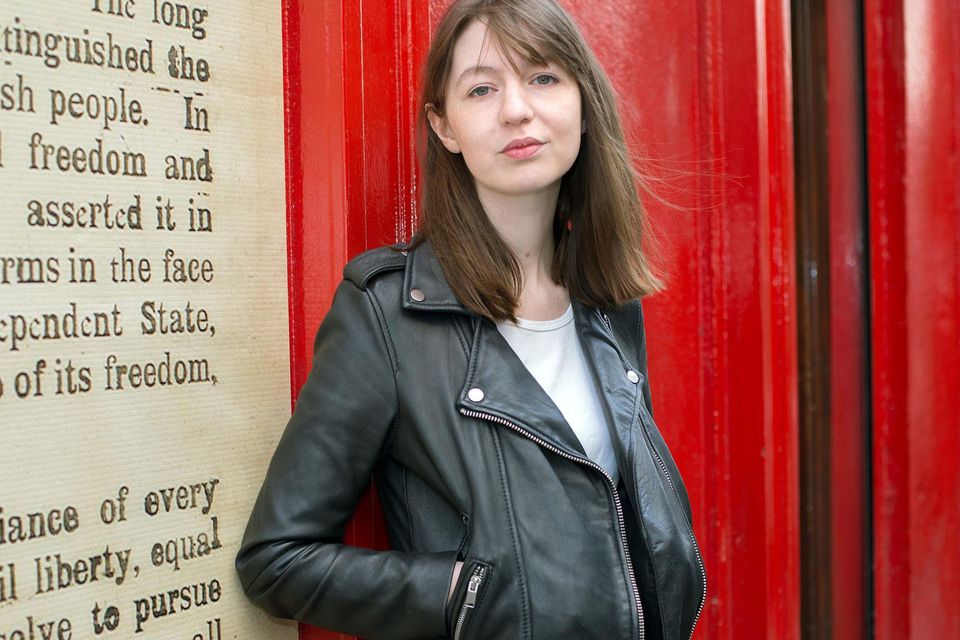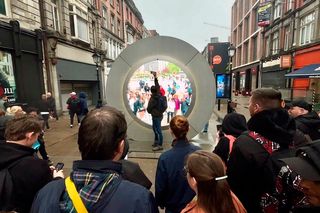Sally Rooney: ‘I don’t think I could write a piece of fiction not set in Ireland’
Author Sally Rooney. Photo: Tony Gavin
Sally Rooney does not think she could ever write a book that was not populated by Irish characters and set in Ireland because she feels “so completely lost with anything other than that”.
The acclaimed Irish author, who has rocketed to global success with her works translated into over 40 languages, told an audience at the Abbey Theatre tonight that she believes the social settings of her books are “irreplaceably Irish”.
And while her British and American readers may, perhaps, see the superficial similarities with their education systems or social scenes, she thinks they may miss out on “how indelibly Irish each of these environments is”.
In an intellectually stimulating though relaxed conversation with fellow distinguished writer Anne Enright, Ms Rooney said she sees her work as being “totally immersed” in Irish themes and writes “so much dialogue that is her own voice and the voice of the people she knows”.
“I don’t think I could ever - maybe it’s a little early to say this - but at the present moment I don’t think I could write a piece of fiction that was not populated by Irish characters and set in Ireland,” she said.
Ms Rooney was before a packed audience at the Abbey to deliver the TS Eliot lecture, pondering his impact on modern literature in this, the centenary year of the publication of Eliot’s seminal work, The Waste Land.
The lecture has been presented at the Abbey Theatre since 2016. Inspired by Eliot’s legacy, previous speakers include Paul Muldoon, Samantha Power and Edna O’Brien.
The Normal People author told the crowd that prompted by her husband, John Prasifka, she had re-read James Joyce’s masterpiece, Ulysses, last year and is “obsessed with it”.
The audience laughed along with her as she admitted that having re-read the modernist masterpiece, she had afterwards opened her “little Word document” where she was trying to write something and thought: “Pathetic. It’s just not as good as Ulysses, at all.”
“But then I make peace with that,” she said, adding that she does feel the influence of Joyce and tries to see it in “an appreciative and admiring way”.
“All my work, everything that I’ve ever written is so influenced, so immersed in the influence of the writers that I love and admire so why not Ulysses – why not be susceptible to the text in that way? Of course, I’m never going to be able to write something that I consider to be as good as Ulysses.
“But why not at least try? I want to be influenced by Ulysses. I want to write something that is influenced by Ulysses.”
Speaking as a reader, she said her most “intense and life changing reading experiences” have always involved deep attachments to fictional characters, describing it as “a sort of mystical almost spiritual experience of attachment” that she tries to also accomplish in her own novels.
The ability to invoke compassion in a reader for a “character that doesn’t exist” is, she believes, “the highest thing that a novel can accomplish”. She described it as having a “moral” quality because of the way a novel can inspire love for a character who can never love the reader back because “that person doesn’t exist”.
Meanwhile, she admitted that she was “probably a very poor analyst” of her own work – but quickly added that she believed it was, to an extent, “intentionally poor” because she does not like to tell people how they ought to read something that she has written.
“I feel that I probably don’t really know what it’s about anyway and if it’s any good, then there’s something good that was sort of hidden from me while I was working at it and somehow made its way into what I was doing.
“There’s a sense in which I don’t want to be too overly aware of what I’m doing,” she said, adding: “It would be boring, worked out in advance in some ways – you have to have that not-knowing.”
People often tell her that her works tends to be about miscommunication and about “saying the stuff that is sort of unsayable” and she said that she is interested in that theme.
The writer said she is also aware of “political ideological stuff that makes certain realities unspeakable to us” that might also come to exert some pressure on her characters – though she said she is not thinking about that when she is “trying to put the commas in the right place”.
Join the Irish Independent WhatsApp channel
Stay up to date with all the latest news















